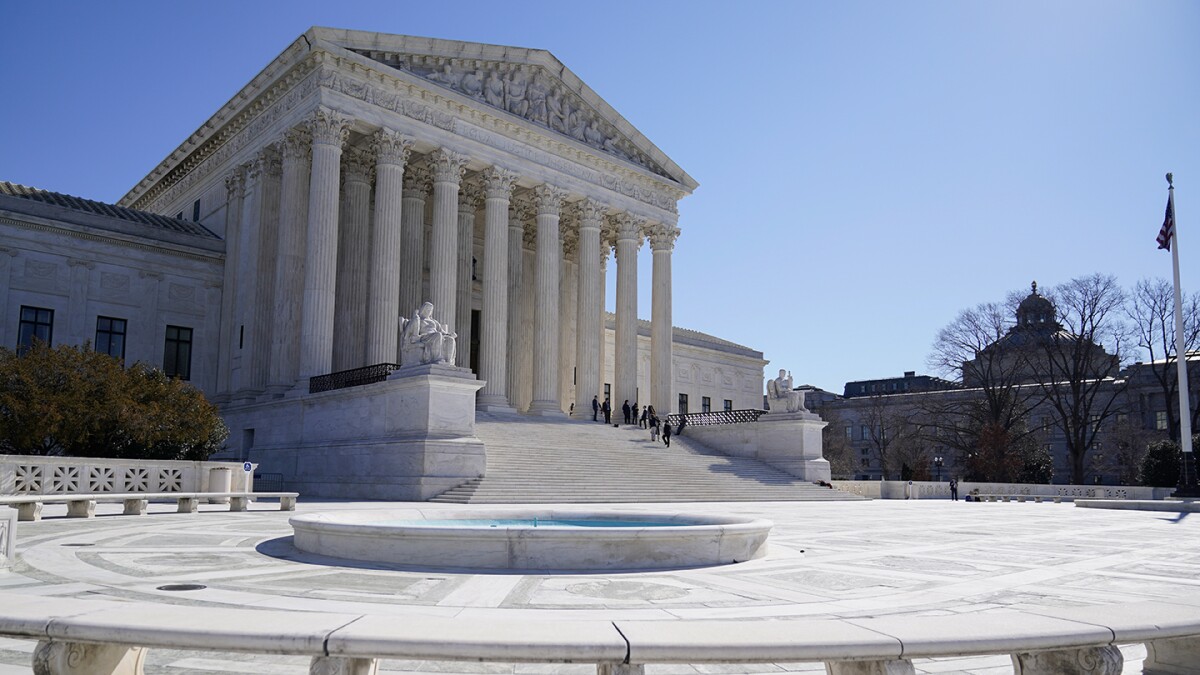
The U.S. Supreme Court on Tuesday declined to take up an Indiana school district’s appeal asking that the justices clarify whether Title IX or the U.S. Constitution’s equal-protection clause bars districts from requiring transgender students to use restrooms corresponding to their “biological sex.”
The court’s action leaves districts without uniform, national guidance on a topic on which federal courts around the country have differed, though advocates for the transgender student pointed out to the court that pending federal regulations on Title IX, which support the right of transgender students to use school facilities consistent with their gender identity, would resolve the question.
The 4,100-student Martinsville district, about 30 miles southwest of Indianapolis, barred a transgender boy identified as A.C. from using boys’ restrooms at his middle school. But the student won a preliminary injunction from a federal district court, which a federal appeals court upheld last year by concluding the student was likely to prevail on both his Title IX and equal-protection claims.
In its appeal to the Supreme Court in Metropolitan School District of Martinsville v. A.C., the district argued that schools across the country faced questions and litigation over how they treated transgender students, and that there was a split among federal circuit courts on the question of restroom access that the Supreme Court should resolve.
The district framed its question presented to the justices as “whether Title IX or the equal protection clause dictate a single national policy that prohibits local schools from maintaining separate bathrooms based on students’ biological sex.”
The district had hired Paul D. Clement, a prominent high court advocate in Washington and a former U.S. solicitor general under President George W. Bush to handle their high court appeal. (As one legal blogger reported in November, Clement, who has argued for a number of conservative causes before the court, offered the district a discount rate on his usual legal fees.)
“This case presents a clean split of authority on a hotly contested issue that requires this court’s resolution,” Clement wrote in his appeal for the district. “People across the nation disagree sharply on the question whether facilities that have long been permissibly separated based on sex—in contexts ranging from bathrooms to sports teams—should be separated based on biological sex or gender identity.”
Student points out district’s differing policy in high school and a pending change in federal Title IX rules
The American Civil Liberties Union, which represents the now 13- or 14-year old transgender student identified as A.C., urged the court not to take up the case.
For one thing, the brief for the student pointed out, the student now attends the district’s lone high school, which has a more flexible policy than the middle school and allows transgender students to use restrooms corresponding to their gender identity depending on certain criteria such as whether they are under a physician’s care for gender dysphoria or have taken legal steps to change their name or gender marker. (In A.C.’s case, in any event, the district court extended its injunction in the boy’s favor to the high school.)
Furthermore, the ACLU argued, the U.S. Department of Education is finalizing an updated Title IX regulation that would endorse the view taken by several federal appeals courts that schools may not exclude transgender students from restrooms and other facilities that correspond to their gender identity.
“There is nothing to be gained by this court taking up a dispute about a regulation that is about to be changed,” the ACLU said. “And once the Title IX question is resolved, there may be no need even to take up the constitutional issue.”
The Martinsville district had appealed an Aug. 1, 2023, decision by a unanimous three-judge panel of the U.S. Court of Appeals for the 7th Circuit, in Chicago.
In upholding the injunction for A.C. (as well as for two transgender students from another Indiana school district), the appellate panel pointed to the 7th Circuit’s own 2017 decision in favor of a transgender student, one of the first in the nation on restroom access under Title IX and the equal-protection clause.
The U.S. Court of Appeals for the 4th Circuit, in Richmond, Va., has also ruled that both provisions of federal law protect transgender students in using restrooms consistent with their gender identity.
Conversely, the U.S. Court of Appeals for the 11th Circuit, in Atlanta, has ruled that neither Title IX nor the equal-protection clause bar school districts from maintaining separate restrooms on the basis of “biological sex.”
In A.C.’s case, Judge Diane P. Wood of the 7th Circuit said it would be up to the Supreme Court to resolve the split.
“Litigation over transgender rights is occurring all over the country, and we assume that at some point the Supreme Court will step in with more guidance than it has furnished so far,” Wood wrote.
But it will not come in the Indiana case, which the high court declined to take up without comment or recorded dissent.



